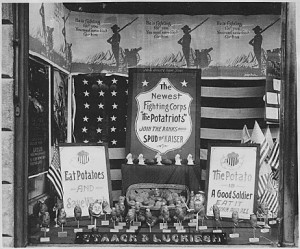Among the many things I’ve been doing since my semester ended is start another MOOC: Nutrition, Health and Lifestyle out of Vanderbilt. Why? Not only does it remind me of my dear, departed sabbatical, I teach food history. In that class we end up spending more time in the present than in any other course that I’ve ever taught and this MOOC is all about the food present.
I’ve almost completed the first week of six or seven so far and it has been very enjoyable. The production values are terrific. The superprofessor, Jamie Pope, is a good lecturer. There’s even a fair bit of history in it. If there’s a structural change between this course and the others I’ve taken, it’s the fact that the multiple choice questions come in the middle of the lecture rather than the end.
What hasn’t changed is the work level. As with the history MOOCs that I’ve taken or observed, there is no required reading in this class whatsoever. I admit to knowing absolutely nothing about nutrition as a discipline (which is one of the reasons I wanted to try this MOOC), but I have a hard time believing that there is a face-to-face nutrition course anywhere in the country that doesn’t have some kind of required reading. After all, reading is an important part of education of all kinds because the act of reading reinforces the learning process. I guess you could argue that the MOOC is nothing but a jazzed-up textbook, but how many other textbooks can you get a certificate for reading?
As I anticipated, Coursera/Vanderbilt is doing practically everything possible not to scare anybody off. Indeed, that’s why some of the lines from the syllabus border on pathetic. For example, after noting that the textbook is not required, the syllabus states that the video lectures provide the “core content for this course.” From what I can tell, the weekly assignments do not require writing (which seems understandable for nutrition), but you can still earn a “Statement of Accomplishment” without submitting any of them.
In one sense, this situation isn’t hurting anybody. 70,000 people are learning about nutrition, gaining knowledge that can improve every person’s life. This is certainly a good thing. In another sense though it may harm a lot a people. This class is on the Coursera Signature Track. While Coursera is clear that completing a class like this earns no college credit, they’re also clear that handing over $30-$100 per course to get your identity and performance verified does have value. Introducing this option, the company wrote on its blog:
We hope that offering verified certification for our courses will open up many new and valuable opportunities for students…
What are those opportunities? Perhaps they just mean professional development, but if you doubt that somebody somewhere is going to try to get college credit out of that certificate then you must have been born yesterday. The same thing goes if you doubt that some college somewhere will be delighted to award credit for that certificate – at a price. [Measured “competencies” anyone?] If enough people take MOOCs on the Signature Track, there may even be a movement to demand it.
If MOOCs could be limited to nerdy edu-tainment, I wouldn’t be writing this. If we could slap a label on every MOOC that says, “Warning: This is not college,” perhaps I would have no problem with them. I know superprofessors believe that they are doing a great public good by putting their lectures online and in a limited sense they are, but MOOCs do not exist in a vacuum. One person’s outreach is another person’s college substitute. That means that one superprofessor’s public service can also be an ill-informed administrator’s deadly weapon against the rest of us and against rigor in higher education in general. To think otherwise is the height of both naïveté and short-sightedness.



Recent Comments